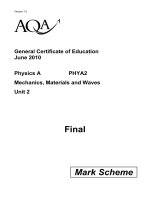AQA ANTH4 w MS JUN15
Bạn đang xem bản rút gọn của tài liệu. Xem và tải ngay bản đầy đủ của tài liệu tại đây (139.66 KB, 17 trang )
A-LEVEL
Anthropology
ANTH4/Unit 4 Practising Anthropology: Methods and Investigations
Mark scheme
2110
June 2015
Version 1.0 Final
Mark schemes are prepared by the Lead Assessment Writer and considered, together with the
relevant questions, by a panel of subject teachers. This mark scheme includes any amendments
made at the standardisation events which all associates participate in and is the scheme which was
used by them in this examination. The standardisation process ensures that the mark scheme covers
the students’ responses to questions and that every associate understands and applies it in the same
correct way. As preparation for standardisation each associate analyses a number of students’
scripts: alternative answers not already covered by the mark scheme are discussed and legislated for.
If, after the standardisation process, associates encounter unusual answers which have not been
raised they are required to refer these to the Lead Assessment Writer.
It must be stressed that a mark scheme is a working document, in many cases further developed and
expanded on the basis of students’ reactions to a particular paper. Assumptions about future mark
schemes on the basis of one year’s document should be avoided; whilst the guiding principles of
assessment remain constant, details will change, depending on the content of a particular
examination paper.
Further copies of this Mark Scheme are available from aqa.org.uk
Copyright © 2015 AQA and its licensors. All rights reserved.
AQA retains the copyright on all its publications. However, registered schools/colleges for AQA are permitted to copy material from this
booklet for their own internal use, with the following important exception: AQA cannot give permission to schools/colleges to photocopy any
material that is acknowledged to a third party even for internal use within the centre.
MARK SCHEME – A-LEVEL ANTHROPOLOGY – ANTH4 – JUNE 2015
QUALITY OF WRITTEN COMMUNICATION
Where students are required to produce extended written material in English, the scheme of
assessment must make specific reference to the assessment of the quality of written
communication. Students must be required to:
•
•
•
ensure text is legible, and spelling, grammar and punctuation are accurate, so that meaning is
clear
select and use a form and style of writing appropriate to purpose and complex subject matter
organise relevant information clearly and coherently, using specialist vocabulary when
appropriate.
The assessment criteria for quality of written communication apply to the assessment of the 20
mark questions. The following criteria should be applied in conjunction with the mark scheme.
The quality of written communication bands must be regarded as integral to the appropriate mark
scheme band even though they are listed separately in the mark scheme. Examiners should note
that, in the assessment of students’ anthropological knowledge and skills, the assessment of the
Quality of Written Communication will be judged through the assessment of the clarity and
appropriateness of the anthropological material presented.
For 20 mark questions:
In the 1 – 7 band, students’ answers are likely to be characterised by the poor logical expression
of ideas and the use of a limited range of conceptual terms, perhaps often used imprecisely and/or
inaccurately. Spelling, punctuation and grammar may show serious deficiencies and frequent
errors, perhaps impairing the intelligibility of significant parts of the answer.
In the 8 – 15 band, students’ answers are likely to be characterised by the fair to good logical
expression of ideas and the competent use of a reasonable range of conceptual terms. Spelling,
punctuation and grammar will be of a reasonable standard. Commonly used words and
anthropological terms will generally be spelt correctly. There may be minor errors of punctuation
and grammar, but these will not seriously impair the intelligibility of the answer.
In the 16 – 20 band, students’ answers are likely to be characterised by the very good to excellent
logical expression of ideas and the precise use of a broad range of conceptual terms. Spelling,
punctuation and grammar will be of a very good to excellent standard. Commonly and less
commonly used words and anthropological terms will almost always be spelt correctly.
Punctuation and grammar will be used correctly throughout to facilitate the intelligibility of the
answer.
INDICATIVE CONTENT AND RESEARCH IN THE MARK SCHEMES
Please note that any of the indicative content and research that is presented in the mark bands of
the higher mark questions may be present in any of the mark bands, not solely the higher band.
3 of 17
MARK SCHEME – A-LEVEL ANTHROPOLOGY – ANTH4 – JUNE 2015
Section A: Research Issues
Total for this section: 40 marks
0
1
Examine some of the ways in which anthropologists might affect the communities they
study.
[10 marks]
0
No relevant points.
1-3
Answers in this band will show only limited knowledge and understanding, and
show very limited interpretation, application, analysis and evaluation.
Lower in the band, there may be one or two very insubstantial points about
ways in which anthropologists might affect the communities they study but
these will be ineffectually used. There will be minimal or no interpretation,
application, analysis and evaluation.
Higher in the band, answers will present one or two insubstantial points about
the ways in which anthropologists might affect the communities they study.
There will be very limited interpretation, application, analysis and evaluation.
4-7
Answers in this band will show reasonable knowledge and understanding, and
show reasonable interpretation, application, analysis and/or evaluation.
Lower in the band, material on one or more ways in which anthropologists
might affect the communities they study will be presented, and some limited
explanation will be offered, for example, that anthropologists might somehow
alter the culture of the communities they study with a brief description of how.
Interpretation, application, analysis and/or evaluation are likely to be limited.
Higher in the band, material on two or more ways in which anthropologists
might affect the communities they study will be presented, and some
explanation offered, for example, precise ways in which the culture might
be affected. Students are likely to make use of specific examples.
Interpretation and application will begin to meet the demands of the question.
Students may begin to offer some analysis and/or evaluation.
8-10
Answers in this band will show sound and detailed knowledge and
understanding of material on two or more ways in which anthropologists might
affect the communities they study. The material will be accurately
interpreted and applied to the demands of the question. Students
will show the ability to organise material and to analyse and/or evaluate it
explicitly, so as to produce a coherent and relevant answer.
Lower in the band, answers may analyse a more limited range of material.
Interpretation and application may be less focused, and analysis and/or
evaluation less developed.
Higher in the band, answers will be more detailed and complete, with a wider
range of material. Interpretation and application of material will be more
focused and answers will show sensitivity in interpretation of the question.
Analysis and/or evaluation will be more relevant and explicit.
4 of 17
MARK SCHEME – A-LEVEL ANTHROPOLOGY – ANTH4 – JUNE 2015
Issues, concepts and theories such as the following, may appear:
•
•
•
•
•
•
•
•
•
•
•
anthropologists might change the culture of the community they study through
their presence, eg assimilation or conflict (Chagnon vs Ferguson, the
Yanomami and manufactured goods)
anthropologists might introduce new technologies
anthropology perpetuates the asymmetries of colonialism, eg Asad
anthropologists might bring illnesses and diseases or medicines and cures to
the populations they study, eg Tierney vs Chagnon and Neel
the community studied may experience products or services better designed to
meet their needs through the work of anthropologists at corporations such as
Intel and General Electric, eg General Electric and dishwashers in Japan
anthropology as advocacy, eg anthropologists in Amazonia (Turner), protecting
the rights of indigenous people and their ways of life
the exoticism of the culture and increased attention from outsiders as a result,
eg Chagnon and the Yanomami (environmentalism) or Lee, Marshall and the
San (ethno-tourism)
local populations might be influenced by anthropologists employed by
government agencies or the military, eg Fardon’s criticism of the US military
recruiting anthropologists for the ‘war of hearts and minds’
communities might feel well represented or misrepresented and misunderstood
by how anthropologists portray them, eg Freeman vs Mead about the Samoans
(nature vs nurture) or Colin Turnbull on the Ik or the Mbuti (intepretivism)
communities might have a reaction to the personal characteristics of the
anthropologists, eg gender, ethnicity, social or cultural background
reference to ethical issues and how the consideration of these might protect
communities or how breaches of them could have a negative impact on the
communities being studied, eg Chagnon, Good or Lizot in relation to the
Yanomami.
Note: However, not all of these are necessary, even for full marks.
Students may show interpretation, application, analysis and evaluation by reference
to issues such as:
•
•
•
•
•
•
•
•
•
application of points to specific examples of the work of anthropologists
analysis and ‘unpacking’ of concepts, eg what is meant by ‘asymmetries’ of
‘colonialism’ (Asad)
comparisons made between different methods eg how some methods may
affect communities more than others
comparisons made between the work of different anthropologists, eg Chagnon
vs Ferguson (Yanomami)
awareness of relevant theoretical perspectives on methodology and the
debates between them, eg interpretivism vs positivism
relevance to question
evaluation of theoretical perspectives on methodology eg reference to reflexive
anthropology
evaluation of specific research methods
evaluation of the work of specific anthropologists.
5 of 17
MARK SCHEME – A-LEVEL ANTHROPOLOGY – ANTH4 – JUNE 2015
0
2
Examine some of the limitations of using questionnaires in anthropological research.
[10 marks]
0
No relevant points.
1-3
Answers in this band will show only limited knowledge and understanding and
show very limited interpretation, application, analysis and evaluation.
Lower in the band, there may be one or two insubstantial points about
questionnaires in general, but these will be ineffectively used. There will be
minimal or no interpretation, application, analysis and evaluation.
Higher in the band, answers will present one or two insubstantial points about
the limitations of using questionnaires. There will be very limited interpretation,
application, analysis and evaluation.
4-7
Answers in this band will show reasonable knowledge and understanding, and
show reasonable interpretation, application, analysis and/or evaluation.
Lower in the band, material on one or more limitations of using questionnaires
will be identified, for example problems of literacy, and some limited
explanation will be offered. Interpretation, application, analysis and/or
evaluation are likely to be limited.
Higher in the band, material on two or more limitations of using questionnaires
in anthropological research will be presented and some explanation offered, for
example, the inability to follow up on anonymous questionnaires when the
informant is not known. Answers are likely to draw comparisons with other
anthropologists’ work. Interpretation and application will begin to meet the
demands of the question. Students may begin to offer some analysis and/or
evaluation.
8-10
Answers in this band will show sound and detailed knowledge and
understanding of two or more limitations of using questionnaires in
anthropological research. The material will be accurately interpreted and
applied to the demands of the question. Students will show the ability to
organise material and to analyse and/or evaluate it explicitly, so as to produce
a coherent and relevant answer.
Lower in the band, answers may analyse a more limited range of material.
Interpretation and application may be less focused, and analysis and/or
evaluation less developed.
Higher in the band, answers will be more detailed and complete with a wider
range of material. Interpretation and application of material will be more
focused and answers will show sensitivity in interpretation of the question.
Analysis and/or evaluation will be more relevant and explicit.
6 of 17
MARK SCHEME – A-LEVEL ANTHROPOLOGY – ANTH4 – JUNE 2015
Issues, concepts and theories such as the following may appear:
•
•
•
•
•
•
•
•
•
•
•
definition of questionnaires
limitations of structured approaches
problems of literacy levels
difficulties with translation
problems of interpreting responses
subjectivity, lying and exaggeration (social desirability bias)
issues of informants’ understanding of the meaning of questions
difficulties in follow-up if anonymous
ethical and political issues (leading questions)
open vs closed questions
quantitative vs qualitative methods.
Note: However, not all of these are necessary, even for full marks.
Students may show interpretation, application, analysis and evaluation by reference to
issues such as:
•
•
•
•
•
•
•
•
•
application of points to specific examples of the work of anthropologists,
eg Michael Smith’s comments on using questionnaires as part of Scribner
and Cole’s study of the Vai of Liberia
analysis and ‘unpacking’ of concepts, eg what is meant by
representativeness, whether generalisation is useful, the difference
between ‘thick description’ (Geertz) and simple questionnaire results
comparisons made between different methods, eg showing limitations
through contrast with other methods such as deep hanging out (Fox), or
the advantage of mass data collection quickly vs lack of depth and thick
description
comparisons made between the work of different anthropologists
awareness of relevant theoretical perspectives on methodology and the
debates between them, eg views on the more scientific nature of
questionnaires as potentially providing quantitative vs qualitative data
relevance to question, eg focus on problems specific to questionnaires
rather than data collection methods in general
evaluation of theoretical perspectives on methodology
evaluation of specific research methods
evaluation of the work of specific anthropologists, eg anthropologists who
have used questionnaires.
7 of 17
MARK SCHEME – A-LEVEL ANTHROPOLOGY – ANTH4 – JUNE 2015
0
3
Evaluate the extent to which anthropological fieldwork can be regarded as scientific.
[20 marks]
0
No relevant points.
1-7
Answers in this band will show only limited interpretation, application, analysis
or evaluation, and will show only limited knowledge and understanding.
Lower in the band, there may be one or two insubstantial points about
anthropological fieldwork with little understanding of relevant issues.
Higher in the band, answers will show limited, undeveloped knowledge, for
example two or three insubstantial points about the extent to which
anthropological fieldwork can be regarded as scientific. Interpretation and
application of material may be simplistic, or at a tangent to the question.
8-15
Answers in this band will show some reasonable interpretation, application,
analysis and/or evaluation and will show reasonable knowledge and
understanding.
Lower in the band, some potentially relevant material will be presented and a
broadly accurate if basic account offered, for example about the extent to
which anthropological fieldwork can be regarded as scientific, but perhaps
without consideration of the alternative point of view, namely that it might be
regarded as an art if more interpretivist in nature. Interpretation may be limited
and not applied explicitly to the demands of the question. Students may make
limited use of anthropological studies in their response. Analysis and/or
evaluation are likely to be very limited or non-existent.
Higher in the band, knowledge and understanding will be broader and/or
deeper. The answer will begin to identify a wider range of issues. These could
include for example awareness of the extent to which anthropological fieldwork
can be regarded as scientific, such as in positivist approaches, and also
awareness of more art-like interpretivist approaches. Answers may provide
more detail about these approaches, with specific examples from
anthropological research. Material will be accurately interpreted, though its
relevance may not always be made explicit. There will be some limited explicit
analysis and/or evaluation.
16-20 In this band, analysis and evaluation will be explicit and relevant, and answers
will show sound and detailed knowledge and understanding of material on the
extent to which anthropological fieldwork can be regarded as scientific as well
as consideration of its more artistic, interpretivist dimensions. This will be
accurately interpreted and applied to the demands of the question. Students
will show the ability to organise material and to analyse and evaluate it
explicitly so as to produce a coherent and relevant answer.
Lower in the band, answers may examine a more limited range of material.
8 of 17
MARK SCHEME – A-LEVEL ANTHROPOLOGY – ANTH4 – JUNE 2015
Interpretation and application may be less focused, and analysis and/or
evaluation less developed. Answers will show some organisation but the
conclusion may be less developed or partially supported by the body of the
essay.
Higher in the band, answers will be more detailed and complete with a wider
range of material. Interpretation and application of material will be more
focused and answers will show sensitivity in interpretation of the question.
Analysis and/or evaluation will be more relevant and explicit. Answers will
show a clear rationale of material leading to a distinct conclusion, and/or may
show a clear rationale in the organisation of material leading to a distinct
conclusion.
Issues, concepts and theories such as the following may appear:
•
•
•
•
•
•
•
•
•
•
debates between the positivistic nature of fieldwork, eg sociobiological
studies of the Yanomami (Chagnon), and the more creative process of
interpretivist approaches, eg the thick description of the Balinese
cockfight (Geertz)
the qualitative nature of anthropological data vs the quantitative nature of
scientific research
some anthropologists’ utilisation of the scientific method, by setting an
hypothesis and testing this with the ethnographic data they gather
the use of social scientific anthropological research tools such as SPSS
or ATLAS.ti software to analyse qualitative data
the similarities in ethical frameworks used by anthropologists and other
scientists
examples of ethnography being written creatively (Abu-Lughod, Writing
Against Culture)
postmodern criticisms of the objectivity of science and thus advocating
the equality of artistic and scientific approaches (Spiro)
examples of the exoticism of anthropological writing (Miner)
importance of the funding institutions (Horowitz) in limiting what an
anthropologist can do, affecting the scope of the anthropological
research and arguably its scientific objectivity
lack of objectivity such that the anthropologist limits their research focus
and therefore may miss out on important aspects of what they are
studying (Weston).
Note: However, not all of these are necessary, even for full marks.
In answering the question, the following may be included to demonstrate
interpretation, application, analysis and evaluation:
•
•
•
•
application of points to specific examples of the work of anthropologists
analysis and ‘unpacking’ of concepts, eg what is meant by humanistic,
scientific, positivist, interpretivist, whether an ultimate truth is ever
actually attainable, science as a worldview
comparisons made between different methods, eg discussion of which
methods might be more or less artistic or scientific
comparisons made between the work of different anthropologists
9 of 17
MARK SCHEME – A-LEVEL ANTHROPOLOGY – ANTH4 – JUNE 2015
•
•
•
•
•
awareness of relevant theoretical perspectives on methodology and the
debates between them, eg the debate between a more scientific
approach contrasted with a politically-motivated approach to research
(feminist or Marxist) or whether fieldwork should be an art or a science
relevance to question, eg directly addressing the language of the quote,
eg why fieldwork is the ‘both’ an art and a science
evaluation of theoretical perspectives on methodology, eg acknowledging
there is debate about what constitutes ‘scientific’
evaluation of specific research methods
evaluation of the work of specific anthropologists.
10 of 17
MARK SCHEME – A-LEVEL ANTHROPOLOGY – ANTH4 – JUNE 2015
Section B: Personal Investigation
Total for this section: 50 marks
0
4
Explain your reasons for choosing the method(s) used to collect your data.
[10 marks]
0
No relevant points.
1-3
Answers in this band will show a limited description of the method(s) used to
collect data with a limited or no attempt to explain the reasons for choosing
it/them.
Lower in the band, there may be limited description of the method(s) used
with no attempt to explain the reasons for choosing it/them.
Higher in the band, there may be more detailed description of the method(s)
used to collect the candidate’s data with a limited or no attempt to explain the
reasons for choosing it/them.
4-7
Answers in this band will show a reasonable explanation of the reasons for
choosing the method(s) used to collect the candidate’s data with specific
reference to the investigation.
Lower in the band, this may be confined to a competent if basic explanation
of the method(s) used to collect the candidate’s data with a reasonable attempt
to explain the reasons for choosing it/them. There will be reference to the
personal investigation and some mention of the relevance of the method(s).
Higher in the band, answers will present a more in-depth explanation of the
reasons for choosing the method(s) used to collect the candidate’s data. The
reference to the personal investigation will be more detailed and students
might make reference to anthropologists who have used these methods in their
research.
8-10
Answers in this band will show sound and detailed knowledge and
understanding of the reasons for choosing the method(s) used to collect the
candidate’s data, eg demonstrating the suitability of the method(s) used and
the contribution it/they made to the personal investigation. Students will show
the ability to organise material and to analyse and/or evaluate it explicitly, so as
to produce a coherent and relevant answer.
Lower in the band, answers may analyse a more limited range of material.
The answer will refer closely to the nature of the investigation.
Higher in the band, answers will be more detailed and complete. Explanations
will be supported by precise and specific references to the investigation.
11 of 17
MARK SCHEME – A-LEVEL ANTHROPOLOGY – ANTH4 – JUNE 2015
Answers may demonstrate:
•
•
•
•
•
•
•
awareness of the nature of the research the student carried out, eg
positivist vs interpretivist, qualitative vs quantitative, and its relevance
to an anthropological approach
the relative merits of different ways of collecting data, eg the value of
audio recording and its contribution to accuracy
awareness of the problems anthropologists can experience when
carrying out research and how a certain method may help them
overcome these, eg truthfulness and participant observation
the suitability of the method in relation to any ethical considerations, eg
a participant’s desire not to be photographed
comparison between their research and the work of other
anthropologists, eg concentrating on a single informant (Shostak)
relevance to the question: a focus on justifying the methods used
rather than simply describing them
methods might include participant observation, structured, semistructured or unstructured interviews, ‘deep hanging out’ (Fox),
questionnaires, surveys, audio recording, ethnographic filming.
Note: However, not all of these are necessary, even for full marks.
Note: Students will be rewarded at all levels for an understanding of the connections
between the issues raised by this question and different elements of the subject;
anthropological concepts and theories; methods of enquiry; ethnography and
substantive social and cultural issues.
12 of 17
MARK SCHEME – A-LEVEL ANTHROPOLOGY – ANTH4 – JUNE 2015
0
5
Examine how anthropological theory and/or ethnographies contributed to your
personal investigation.
[20 marks]
0
No relevant points.
1-7
Answers in this band will show only limited knowledge and understanding of
theory and/or ethnographies with limited reference to the personal
investigation. There will be only limited interpretation, application, analysis
and/or evaluation.
Lower in the band, answers will present one or two very insubstantial points
about theory and/or ethnographies with little reference to the personal
investigation.
8-15
Higher in the band, answers will present two or three insubstantial points
about theory and/or ethnographies. For example, answers may describe
a theory and/or ethnography considered but make little attempt to relate them/it
to the question. There may be no identification of a specific ethnographic study
used or no mention of an anthropologist associated with a theory. Interpretation
and application of material may be simplistic or at a tangent to the question.
.
Answers in this band will show reasonable knowledge and understanding of
theory and/or ethnographies and will examine these with specific reference to
the details of the personal investigation. There will be some reasonable
interpretation, application, analysis and/or evaluation.
Lower in the band, answers will offer a basic examination of how theory
and/or ethnographies contributed to the personal investigation, for example a
simplistic account of which theory is used in the study and why, or a list of
the ethnographies that were used for comparison, with how these contributed
to the personal investigation being left more implicit. Interpretation, application,
analysis and/or evaluation are likely to be limited.
Higher in the band, answers will offer a fuller examination of how theory
and/or ethnographies contributed to the personal investigation, for example,
explaining how a particular theory gave meaning to the data in the personal
investigation. The references to the investigation will be more detailed.
There will be more developed interpretation, application, analysis and/or
evaluation.
16-20 Answers in this band will show sound and detailed knowledge and
understanding of how theory and/or ethnographies contributed to the
personal investigation. Students will show the ability to organise material and
to analyse and/or evaluate it explicitly so as to produce a coherent and
relevant answer.
.
Lower in the band, answers may analyse a more limited range of material.
The answer will refer closely to the nature of the investigation, but the link
between theory and/or ethnographies and the investigation will be less explicit.
13 of 17
MARK SCHEME – A-LEVEL ANTHROPOLOGY – ANTH4 – JUNE 2015
Higher in the band, answers will be more detailed and complete. Explanations
will be supported by precise and specific references to the investigation and
the links between the specific investigation and theory and/or ethnographies
will be made fully explicit.
Answers may demonstrate:
•
•
•
•
•
•
•
•
•
•
theory/-ies used to test the empirical data that the student gathers as part of
their personal investigation, eg setting an hypothesis based on a theory and
testing it for accuracy in the candidate’s context of their personal investigation
theoretical models that the student applies to their data, eg van Gennep’s rites
of passage
theory/-ies related to methodological approaches in anthropology, such as
positivism, interpretivism and postmodernism
theory/-ies that influenced the student to ask the particular question or phrase
the hypothesis as they did, eg Marxism or feminism
particular theoretical approaches that are central to the discipline, eg cultural
relativism (Boaz)
ethnographies that encouraged the student to pursue a particular issue or
anthropological topic or theme
ethnographies that are used to contrast with the empirical data that the student
gathers
ethnographies that gave the candidate ideas as to the method(s) to employ in
the research
the nature of anthropology as a comparative subject
noting relationships with other areas of anthropology.
Note: However, not all of these are necessary, even for full marks.
Note: Students will be rewarded at all levels for an understanding of the connections
between the issues raised by this question and different elements of the subject;
anthropological concepts and theories; methods of enquiry; ethnography and
substantive social and cultural issues.
14 of 17
MARK SCHEME – A-LEVEL ANTHROPOLOGY – ANTH4 – JUNE 2015
0
6
Examine the extent to which you achieved the initial aims of your personal
investigation.
[20 marks]
0
No relevant points.
1-7
Answers in this band will show only a limited knowledge and understanding of
the extent to which the personal investigation achieved its initial aims. There
will be only limited interpretation, application, analysis or evaluation.
Lower in the band, answers will present one or two very insubstantial points
about what the personal investigation achieved.
Higher in the band, answers will present two or three insubstantial points
about the extent to which the personal investigation achieved its initial aims
however these achievements will not be linked to evidence of how they meet
the aims, even if the aims are identified. Interpretation and application may be
simplistic, or at a tangent to the question.
8-15
Answers in this band will show reasonable knowledge and understanding of
the extent to which the initial aims of the study were achieved and will examine
these with specific reference to the details of the personal investigation. There
will be some reasonable interpretation, application, analysis and/or evaluation.
Lower in the band, answers will offer a basic account of the extent to which
the personal investigation achieved its initial aims and will present some
discussion or evidence to support what the candidate says. There will be
references to the personal investigation, but lacking in detail. Interpretation,
application, analysis and/or evaluation are likely to be limited.
Higher in the band, answers will offer a fuller account of the extent to which
the initial aims of the personal investigation were achieved, with specific
evidence to support the candidate’s position. The references to the
investigation will be more detailed and comparisons might be drawn with the
work of other anthropologists. There will be more developed interpretation,
application, analysis and/or evaluation.
16-20 Answers in this band will show sound and detailed knowledge and
understanding of the extent to which the personal investigation achieved its
initial aims, fully supported by evidence taken from the investigation. Students
will show the ability to organise material and to analyse and/or evaluate it
explicitly, so as to produce a coherent and relevant answer.
Lower in the band, answers may analyse a more limited range of material.
The answer will refer closely to the nature of the investigation.
Higher in the band, answers will be more detailed and complete. Explanations
will be supported by precise and specific references to the investigation.
15 of 17
MARK SCHEME – A-LEVEL ANTHROPOLOGY – ANTH4 – JUNE 2015
Answers may demonstrate:
•
•
•
•
•
•
•
•
•
•
•
•
•
•
awareness of the difference between the initial aims of the investigation and
the results and conclusions drawn
detailed description of the evidence that supports or denies the relative
success of the investigation
understanding of the potential value of unexpected findings
acknowledgment of the need to adapt an investigation as empirical evidence
comes to light
awareness that limitations of findings may have made it difficult to meet the
initial aims, eg the scope of the research was too narrow or the scope was too
broad such that it was difficult to make sense of the data
awareness of the problem of generalisation
awareness of the relationship between the conclusions drawn and the initial
aims, eg different aims may have led to different conclusions, eg the use of a
different theoretical approach (Marxism, feminism)
reference to specific research methods that might have been used and how
methods might have influenced the relative success of the study, eg long term
participant observation may have led to different results
the link between the extent to which the initial aims of the investigation were
met and the potential for further research, eg the findings of the personal
investigation were inconclusive or partially conclusive leaving the potential for
future study
reference to specific examples from the research that meet the initial aims and
others that do not
comparison between their research and the work of other anthropologists, eg
how their findings might be similar or different or how their research could be
linked with other research projects in anthropology
further possible research recommendations such as, different locations, a
different angle on the same topic, eg looking at different forms of body
modification rather than just tattoos, the same topic but different social groups,
eg the potential for different results among different genders
awareness of the importance of ‘reflexivity’ in anthropology and an
understanding of issues that may have affected the relative success of the
candidate’s investigation, eg objectivity vs subjectivity
particular comments on ‘extent’, considering the relative success of the
personal investigation as a whole.
Note: However, not all of these are necessary, even for full marks.
Note: Students will be rewarded at all levels for an understanding of the connections
between the issues raised by this question and different elements of the subject;
anthropological concepts and theories; methods of enquiry; ethnography and
substantive social and cultural issues.
16 of 17
MARK SCHEME – A-LEVEL ANTHROPOLOGY – ANTH4 – JUNE 2015
ASSESSMENT GRIDS FOR A-LEVEL ANTHROPOLOGY UNIT 4 (ANTH4)
Examination Series: June 2015
Section A
ASSESSMENT OBJECTIVES
Questions
AO1
AO2
Total
0
1
4
6
10
0
2
4
6
10
0
3
8
12
20
Total
16
24
40
Section B
ASSESSMENT OBJECTIVES
Questions
AO1
AO2
Total
0
4
4
6
10
0
5
8
12
20
0
6
8
12
20
Total
20
30
50
Paper Total
36
54
90
Converting Marks into UMS marks
Convert raw marks into Uniform Mark Scale (UMS) marks by using the link below.
UMS conversion calculator www.aqa.org.uk/umsconversion
17 of 17









